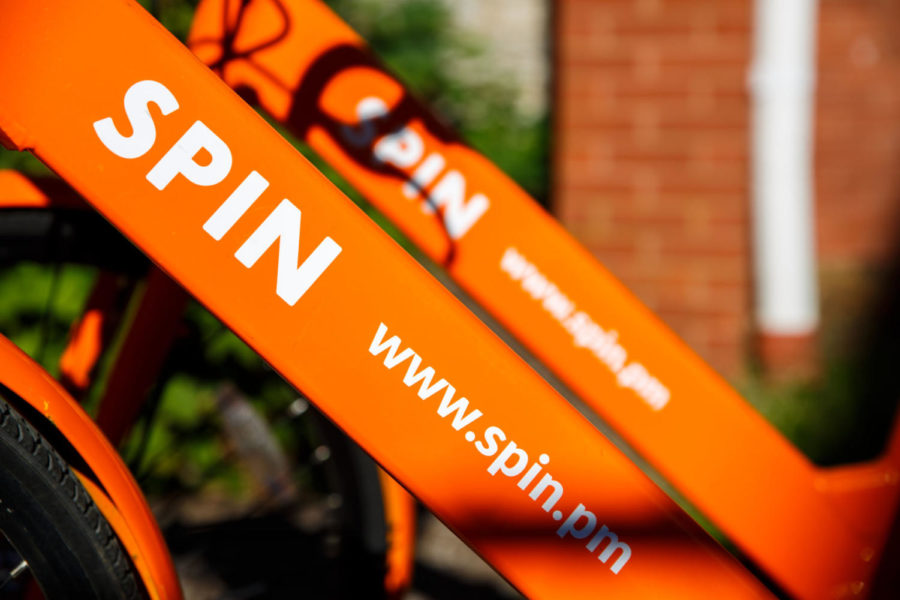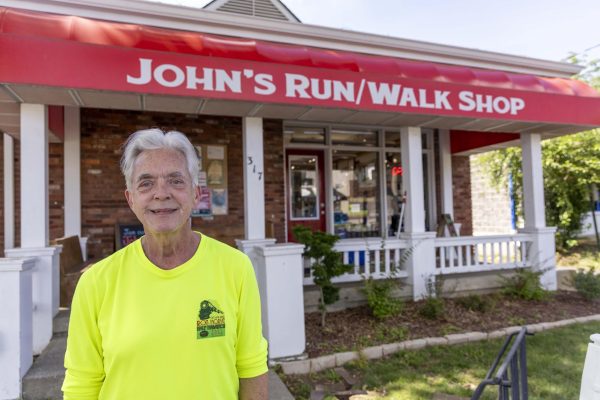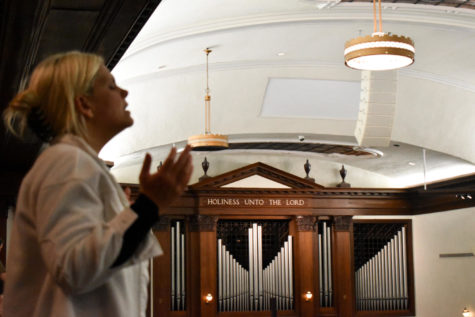Spin bikes, scooters may be answer to Lexington, UK parking woes
Spin bikes are parked in random locations all over UK’s campus and the surrounding area. Photo by Jordan Prather | Staff
October 29, 2018
Since the introduction of rentable Spin bicycles to Lexington streets and UK’s campus, transportation officials have heard one major complaint from citizens: They’re Tennessee orange.
“I have heard some push back on the color,” UK Director of Transportation Services, Lance Broeking said with a laugh. “Why orange? Obviously in Kentucky we don’t like orange or red and those kinds of things.”
Although they may be the wrong color— Broeking explained that the city and UK had no control over the color of the bikes— the rentable bikes and soon-to-come motorized scooters may be a part of the city’s and UK’s larger ongoing solution to solve the parking and urban accessibility issues that plague many of those who frequent campus and downtown Lexington.
Spin bikes— bicycles with 26-inch wheels that can be rented by anyone with the Spin app on their smart phone for $1 for every 30 minutes— began appearing around Lexington over the summer. As early as this upcoming spring, the bikes will be joined by rentable electric scooters from the same company. The city and UK entered into a one-year-long pilot program with Spin, during which officials will collect data on how to best regulate and use the bikes and scooters.
“The initial data has been really good,” said Scott Thompson, Lexington’s transportation planner.
He said that 12,000 people have the Spin app, and the company is averaging 5,000 to 7,000 trips per month. Most of those trips are under a mile, which Thompson said is ideal.
For UK students, many of whom have to walk some distance from off-campus housing or parking lots to get to their classes on campus, time saved by a rentable bike or scooter could mean more time sleeping in, cramming or relaxing.
“I mean a 20-minute walk is a three-to-five-minute bike ride,” Thompson said. “You really start to talk about time and transportation is all about time, right?”
Thompson said that Spin employees claim that the scooters— which require no peddling— get nine to 10 times more rides than the rentable bikes.
“Their logic is that they see nine to 10 times the ridership because if it’s hot and you’re going to a business meeting and you don’t want to show up a sweaty mess— there’s options,” Thompson said.
UK is still trying to best accommodate for the Spin scooters. Sandra Broadus, UK’s alternative transportation manager, said university officials are uncertain on how the scooters will interact with the current campus infrastructure.
“We don’t have scooter racks on campus. We don’t have scooter lanes,” Broadus said. “We’re just trying to figure out what that looks like and how we’re going to handle not only where they operate but how they operate.”
But having a wider array of public transportation generally means less cars, less traffic and more open parking spaces.
“We’ve seen the bike share model explode because there’s a desire particularly within urban environments to create car-free mobility options,” Broeking said.
He added that the university is interested in a bike-share model like Spin first from a “sustainability perspective” but also from a “business perspective” as it may lessen parking congestion.
“Parking is a scarce commodity on campus and so we’re always looking to find ways for people to get to, from and around campus without having to having to have that single-occupancy vehicle,” Broeking said. “If you go back 20 years, the only way to go three miles was to hop in your car and go three miles.”
Now, he said, students can hop on any Lextran bus for free or they can ride a rented bike around the city’s bike lanes.
“We’re trying to find ways to facilitate that movement without the need to have a car,” Broeking said.
Beyond UK, Thompson said that onslaught of shared bikes, scooters, cars and buses nationwide is just the beginning of major changes in urban planning that is sweeping through the modern world.
He said that city transportation planning is “going through change that we haven’t seen the likes of since the advent of the automobile. We as a community need to start thinking about how we plan our spaces. What happens to all this parking? How do all these things change? How do we manage scooters? How do we manage whatever vehicle may be next? We just don’t know.”
Figuring out how to manage these new options in ways that are best for the communities that they serve is an extremely exciting challenge for current city and transportation planners.
“It’s so cool,” Thompson said. “I’m so pumped I can hardly stand it.”
But at least for now, students and citizens will have to deal with the color of their rentable shared mobility options.
“If we were operating our own bike share, I’m sure they would be blue,” Broadus said with a laugh.




















































































































































